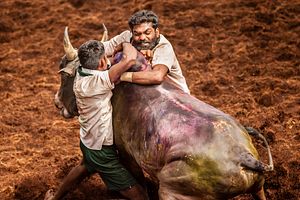The People for the Ethical Treatment of Animals organization, or PETA, has recently authored a petition regarding the continuation of a ban on jallikattu. A bull-taming sport, jallikattu was until recently legal in India’s southern state of Tamilnadu. Just like rodeo, and in contrast to corrida, jallikattu is not intended to cause the death of the animal, although the confrontation can often lead to injuries to both people and bull (the former being more likely to get hurt). The PETA petition, therefore, this time points not only to the harm done by animals but that done to humans as well.
In fact, Jallikattu was banned in 2014 by the Supreme Court of India along with a number of other practices, such as bullfights and bullock cart races. However, given that some in Tamilnadu would like the tradition to continue, and with apprehension that the current government may change the law, PETA has again spoken out against jallikattu with a petition signed by a number of cinema and sporting celebrities.
The ban and the debate that surrounds it have several dimensions. First, it is a tradition-versus-animal-rights debate. Jallikattu is defended not only by pointing out that the bulls are not killed but also by insisting that it is a part of Tamilnadu’s culture or tradition. A question that arises is thus whether the rights and security of animals should trump tradition.
While jalikattu has been banned, the common slaughter of animals for the Muslim festival of sacrifice, Eid-al-Adha, is not. Nor is the Hindu practice of sacrificing animals to the Goddess (contrary to Nepal, where it was recently outlawed). Jallikattu, however, is not a religious practice as such, although it is a traditional part of celebrating an important Tamil festival, Pongal. It may be assumed that banning jallikattu, which is also more regional than is the practice of animal sacrifice, did not cause the outcry that banning of animal sacrifice would. This is despite the fact that animal sacrifices are obviously far more cruel (at least in terms of the final result) than jallikattu is. On the other hand, jallikattu defenders may point out that a logical outcome of striving to protect the animals from harm should be to ban their consumption altogether. This is, however, suggested by hardly anybody. Still, such a step could be advocated both from the position of modern animal rights, as well as from a strand in Indian thought that seeks complete ahinsa, or non-violence.
Take the case of cow slaughter. It had been mentioned in India’s Constitution and later introduced in a number of states – cows are considered sacred by Hindus. Animal sacrifice and cow protection cases are similar precisely because in both instances religious issues trumped other considerations. Nominally, however, the promise of banning cow slaughter in the Directive Principles of the Indian Constitution was based on non-religious argumentation, such as securing rural welfare. This is yet another case when the secularism of the Indian state turns out to be a rhetorical arrangement that, instead of grabbing the bull by the horns, so to speak, tries to talk of religious and traditional issues without calling them such. As mentioned above, the practice of jallikattu could have been just as well confronted by invoking the idea of ahinsa.
This leads to another debate on the policy of non-interference versus the idea of the state’s engagement in banning or reforming traditions. Some authors, including D.E. Smith in his classical study India as a Secular State, have claimed that while India’s theoretical idea of secularism was originally based on, among other things, the idea of the state’s non-interference in religious affairs (many would already disagree with this on a theoretical level), in practice, the state got involved in banning or reforming religious traditions. Sometimes it was done in the name of general human rights, such as in the case of devadasis, temple servants often forced into prostitution. At other times it was done in the name of religious rights, the main case being the state forcing the temples to open their gates to dalits (untouchables). At still other times, the state stopped short of introducing an all-encompassing reform, as in the case of personal law reform, when the apprehensions over the reaction of conservative Muslims led to reforming the Hindu, but not the Muslim personal law (just as, it may be assumed, jallikattu was banned but not animal sacrifice). As a result the state found itself deeply involved in religious reform and even forced to define religious notions. For example, enforcing dalit entry to Hindu temples caused some communities to claim in court that there are not Hindus. This forced the Supreme Court of a secular state to define who is a Hindu.
Moreover, the Indian state presumably cannot avoid acting towards the traditions of a given community, but even more so towards possible conflicts among various communities over their respective traditions. For example, should the state remain neutral if cows are to be sacrificed by Muslims for Eid-al-Adha and protected by Hindus because of their religious status, a situation that raises the specter of conflict? This, of course, was not the case with jallikattu, as to this writer’s knowledge other religious communities did not strive to ban it (although it could have been theoretically done by other, non-Tamil Hindus in the name of protecting bulls). However, such deliberations possibly demonstrates that the state’s indifference would often be not only unethical but downright dangerous. If, therefore, one assumes that India’s secularism should mean non-interference, then jallikattu should not have been banned. In that case, then, other religious practices should have been left alone as well. If, on the other hand, it is assumed that interference in religious affairs is necessary, than banning jallikattu continues a history of the Indian state’s engagement with Indian traditions.

































